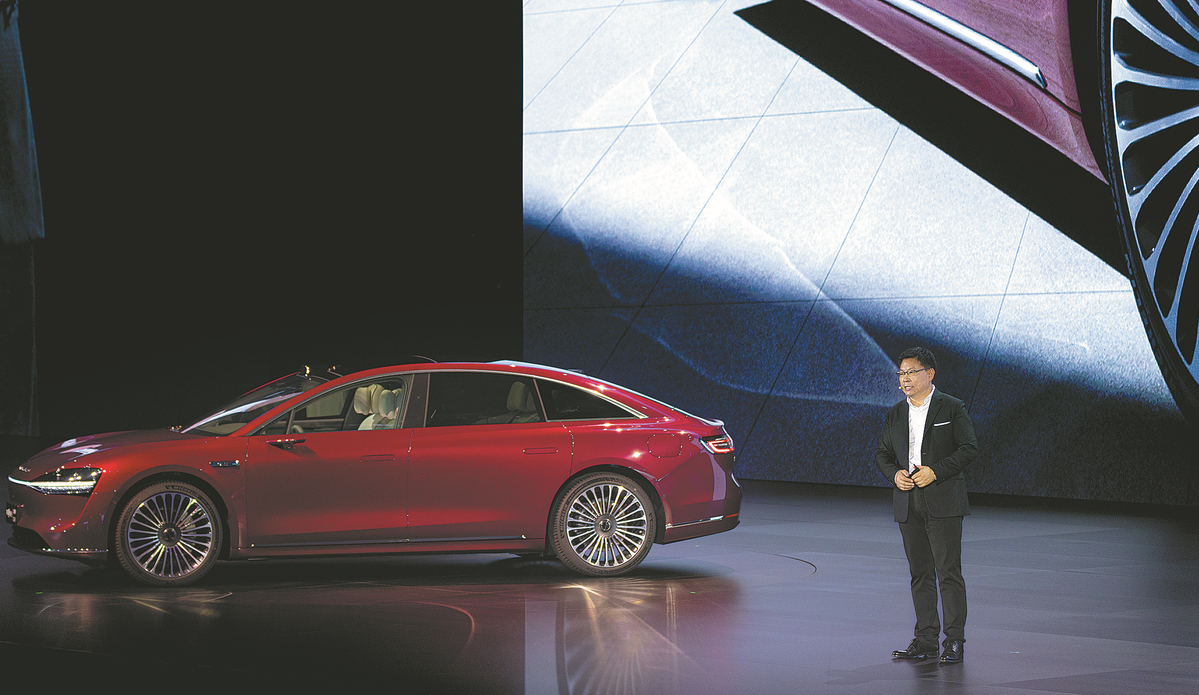Luxury sedan takes aim at BMW, Mercedes

Chinese technology giant Huawei and State-owned carmaker BAIC launched the Stelato S9 last week, seeking to make an inroad into the segment that has been dominated by the Mercedes-Benz S Class and BMW 7 Series.
Yu Chengdong, chairman of Huawei's intelligent automotive solutions business unit, said he expects the large electric sedan to become a new benchmark in the luxury executive sedan segment.
He said the Stelato S9, with a 3,050-millimeter wheelbase, has more room, better acceleration and braking, lower air drag, smarter functions and a smoother ride than the high-end BMW or Mercedes-Benz sedans. Yet it is offered at a much lower price. The Stelato S9 is in two variants, Max and Ultra, priced from 399,800 to 449,800 yuan ($55,770 to $62,750).
A total of 2,500 orders were placed for the car within the first 24 hours of its launch in Beijing on Tuesday.
BAIC Chairman Zhang Jianyong said that the State-owned carmaker is "all-in" on the Stelato S9. He said vehicles from Chinese brands accounted for roughly 8 percent of the luxury sedan segment, adding that he expects the Stelato S9 to change the status quo.
BAIC, the largest shareholder of Mercedes-Benz, produces Mercedes vehicles in China through its joint venture with the German brand.
The Stelato S9 is a car that neither BAIC nor Huawei can afford to see fail as the two are both on uphill journeys.
BAIC, which is reliant on its partnerships with Mercedes and Hyundai, is in dire need of a domestic model that can prove its competitive edge in the NEV sector.
It was one of the first Chinese carmakers to produce electric vehicles but its low-end positioning in the market did not earn the State-owned company esteem. Also, its high-end Arcfox marque did not see sales take a turn for the better until recently.
Huawei's first step into the automotive industry with the AITO SUVs codeveloped with Seres was extremely successful. Cumulative sales of the brand's three models hit 400,000 units in July. The flagship M9, unveiled in late 2023, has been the best-selling SUV priced at more than 500,000 yuan on the Chinese mainland for months, with its cumulative deliveries exceeding 70,000 units.
However, Huawei's first try in the sedan segment did not work out as many had anticipated. Sales of the Luxeed S7, a midsized sedan codeveloped with Chinese carmaker Chery, stand at around 2,000 units.
Yu attributed the model's lackluster performance to inadequate marketing.
Now that AITO is a competitive player in the luxury SUV segment, if the Stelato can prove a hit in the luxury sedan segment, it means that Huawei has established itself as an automotive supplier that excels in smart solutions, said analysts.
Chinese carmakers value smart onboard functions the most, ranging from voice assistants, real-time navigation and digital keys, according to a J.D. Power report released last week.
The Stelato S9, if proving to be a hit, will win Huawei more acclaim — and therefore software orders — from carmakers vying to grab the attention of tech-savvy drivers in China, the world's largest and most competitive market for electric smart vehicles.
That is why the sedan features some of the latest technologies from Huawei. Among them are its operating system, shared with the company's smartphones, which offer a smooth connection and its newest advanced driving system, as well as cutting-edge functions, such as those to relieve car sickness and to shield the driver from passenger chatter.
Huawei's ambition to establish itself as a top automotive supplier has prompted it to establish a league called Harmony Intelligent Mobility Alliance, whose members are carmakers that adopt its smart solutions.
In marketing, HIMA's name usually goes before the brands and models Huawei codevelops with carmakers to imply that the vehicles' performance is enabled by Huawei, like Intel does in the computer sector.
In the alliance are four Chinese carmakers: Seres, Chery, BAIC and JAC. JAC, the only one which has not seen a vehicle born out of the marriage with Huawei, said the first model will roll off the assembly line later this year. Huawei's Yu said the model will take on Rolls-Royce.
The alliance's cumulative deliveries totaled 238,287 vehicles in the first seven months of this year. The lion's share went to AITO, codeveloped by Huawei and Seres, whose achievement the three other partners aspire to replicate.

